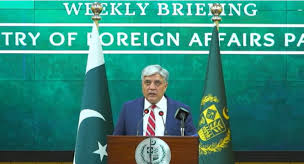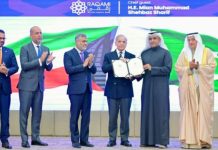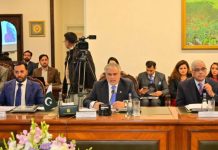ISLAMABAD, Mar 27 (APP/DNA):Pakistan on Thursday welcomed the recently agreed upon limited ceasefire between Russia and Ukraine, prohibiting attacks on energy infrastructure and ensuring safe navigation in the Black Sea.
Foreign Office spokesperson Shafqat Ali Khan, at his weekly press briefing here, appreciated the active engagement of the US administration and its leadership in securing the agreement between Russia and Ukraine.
He expressed optimism that the new momentum generated by these initial steps would eventually lead to a comprehensive and permanent ceasefire.
“Pakistan’s position on the Ukraine conflict has been consistent. Pakistan has enjoyed friendly relations with both Russia and Ukraine. We have always advocated dialogue and diplomacy, immediate cessation of hostilities and peaceful resolution of this conflict,” he remarked.
The spokesperson said that Israel’s continued and repeated incursions and air strikes into the Syrian territory, continued violations of the 1974 Disengagement of Forces Agreement, and its declared intent for an indefinite presence and full demilitarisation of Syria were unacceptable, “constitute blatant violation of Syria’s sovereignty and territorial integrity and undermine international law and regional stability.”
He said that durable peace in Syria hinged on a credible political transition, national unity and reconciliation and inclusive governance.
Spokesperson Khan expressed concerns over the series of raids by the Indian authorities on the residences belonging to members of different constituents of All Parties Hurriyat Conference in Indian Illegally Occupied Jammu and Kashmir (IIOJK) which he said were aimed at crushing dissent and intimidating the local people.
“We urge the Indian authorities to stop these oppressive measures, and respect the fundamental rights and freedoms of the Kashmiri people, including their right to self-determination,” he said.
Coming to a statement by the UN experts demanding the release of Baloch protestors, the spokesperson said the comments lacked balance and proportionality, downplaying civilian casualties inflicted by terrorist attacks while disregarding the crimes committed by miscreants who deliberately disrupt public services, obstruct freedom of movement, and create an atmosphere of insecurity.
He said that such elements were not mere protesters but active participants in a broader campaign of lawlessness and violence.
“Hiding behind a facade of alleged grievances, these elements are operating in collusion with terrorists evident from their coordinated efforts to obstruct State responses, including synchronized roadblocks facilitating terrorist attacks.”
He said that the latest proof of this nexus was their unlawful storming of the District Hospital in Quetta, where they forcibly seized the bodies of five terrorists eliminated during the Jaffar Express hostage rescue operation. Three of these bodies were retrieved back from these violent protestors by the police.
He said that the pattern of “selective and disproportionate” focus by the UN machinery served no constructive purpose. Instead, it inadvertently emboldens extremist elements, fuels unwarranted media sensationalism, incites disorder, and most alarmingly exacerbates societal polarization and fragmentation, he added.
He said that the statement by the UN Special Procedures Mandate Holders stood in stark contradiction to the very essence and spirit of the UN’s own Resolution 2354.
“Rather than supporting a sovereign State in its determined and resolute efforts to combat terrorism, such statements risk legitimizing extremist narratives, an outcome that is not only counterproductive but also fundamentally at odds with the principles the UN purports to uphold.”
He also apprised the media of the recent visit of Special Representative for Afghanistan Ambassador Mohammad Sadiq to Kabul, he said that during a meeting with Acting Foreign Minister of Afghanistan Amir Khan Muttaqi, both sides exchanged views on all issues of mutual concern, including peace and security, trade and economic cooperation, as well as people-to-people contacts.
Both sides agreed to enhance high-level engagement and dialogue to strengthen bilateral cooperation.
The two sides also reinforced their commitment to a mutually beneficial bilateral relationship, with a view to achieving lasting regional peace and stability.

















